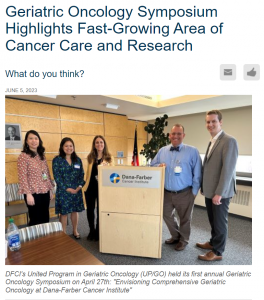First Annual Symposium in Geriatric Oncology at DFCI!

The growth of geriatric oncology has brought welcome attention to the largest group, by age, of adults with cancer: those over age 65. But it shouldn’t obscure the reality that older patients are no less diverse than any other population, keynote speaker Nicolò Matteo Luca Battisti, MD, stated at the Institute’s inaugural Geriatric Oncology Symposium on April 27. Organizers plan for it to be an annual event.
Titled “Envisioning Comprehensive Geriatric Oncology at Dana-Farber Cancer Institute,” the symposium spotlighted the Institute’s efforts to improve care for older patients by sharing ideas and research results across departments and disease centers. The event, which attracted more than 70 attendees, featured faculty presentations on clinical research initiatives in geriatric oncology at Dana-Farber and Brigham and Women’s Hospital and an overview of clinical geriatric oncology programs at the Institute.
Speakers included Dana-Farber clinicians and clinical researchers Gregory Abel, MD, Rachel Freedman, MD, MPH, Stephanie Berg, DO, and Nadine Jackson McCleary, MD, MPH, in addition to geriatric-focused clinicians and researchers Christina Minami, MD, MS, and Tammy Hshieh, MD, MPH, and Clark DuMontier, MD, and Sandra McAllister, PhD, of Brigham and Women’s Hospital. The symposium focused on current programs and research initiatives, scientific priorities, synergies across the programs, and prospects for a Dana-Farber-wide collaboration in caring and learning from older patients with cancer. “We are fortunate to have a thriving geriatric oncology community here at DF/BWH Cancer Center and to attract such a renowned speaker as our first guest,” Abel said.
In his keynote, Battisti, president of the International Society of Geriatric Oncology (SIOG) and a consultant medical oncologist at the Royal Marsden NHS Foundation Trust in England, summarized the importance of these efforts. He discussed how the promise of personalized medicine for older patients begins with tools for gauging their ability to benefit from, and tolerate, cancer therapy. For patients who are fit, have few other health problems, take few medications, and can easily handle day-to-day activities, extending survival is a primary concern. For patients who are frail, have multiple health problems, and are susceptible to toxic side effects of therapy, quality of life considerations are especially relevant.
“We need to devise treatments that take into account patients’ comorbidities [other illnesses], psychological well-being, nutritional status, cognitive and physical function, social support, and overall quality of life,” Battisti said.
He described evaluations being implemented worldwide and at Dana-Farber, including geriatric assessments of everything from patients’ vision, hearing, and sleep, to their cognitive functioning and physical performance. He discussed how this evaluation can help medical teams connect patients to resources to optimize their quality of life.
The benefits of such “oncogeriatric care” are self-reinforcing, Battisti said. “Over decades of research, we’ve learned this form of care can improve survival, improve mental health, predict treatment complications, reduce unplanned hospital admissions, reducing severe side effects of systemic therapy, and more.”
“This inaugural symposium signals the deep interest and investment in improving care outcomes for older adults diagnosed with hematologic or solid tumor malignancies at Dana-Farber and supporting research to develop interventions focused on this growing population,” McCleary said.
“We are delighted that our first symposium brought staff from so many disciplines together around this important topic,” Freedman added. “We had great discussions around how we can improve upon the care of our older patients and how we can work together to make our approaches more uniform and coordinated across Dana-Farber.”
Check out our recently published paper in the Journal of Geriatric Oncology! We examine disparities in treatments offered to older (age 70+) vs. younger adults with colorectal cancer. Age and comorbidity association with survival outcomes in metastatic colorectal cancer: CALGB 80405 analysis
Advocating for equity in access to clinical trials and treatments for older patients.
SOAR with us: Our Stories of Older Adult Resilience (SOAR) feature fellow patients’ cancer care experiences. Email us if you’d like to be featured and share your story at REACH@dfci.harvard.edu. Thank you!